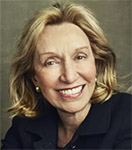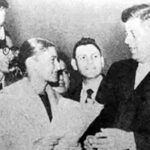Review | Peace Corps beginnings in AN UNFINISHED LOVE STORY by Doris Kearns Goodwin
John writes —

Doris Kearns Goodwin
I have been reading author Doris Kearns Goodwin’s An Unfinished Love Story and I strongly recommend this “personal history of the 1960s” by her.
First Doris Kearns Goodwin is a wonderful writer, and has stories to tell about the first days of the Kennedy administration, and the start of the Peace Corps — JFK’s famous introduction of the agency at 2 a.m. in the morning, for example, on the campus of the University of Michigan.
Kennedy spoke for 3 minutes, Doris Kearns writes,
“Yet something extraordinary transpired: The students took up the challenge he posed. They organized, they held meetings, they sent letters and telegrams to the campaign asking Kennedy to develop plans for a volunteer Peace Corps (it was not then called ‘Peace Corps’). They signed petitions pledging to give not two but three years of their lives to help people in developing countries.”
During that week, she writes, “Kennedy met with two Michigan graduate students — a married couple, Alan and Judith Guskin (Thailand 1962–64) — who had lodged in his memory because they were leaders of both the letter-writing campaign and the petition drive.

Judith Guskin meeting the president with her petition signed by thousands
For her book, Doris Kearns Goodwin would write about Alan and Judith, and their interview with them, and would track their ‘Peace Corps’ lives as PCVs in Thailand 1961-64.
(We, too, on our Peace Corps Worldwide site, have written about what Judith and Allen did to create the Peace Corps. )
I suggest that you look at Goodwin’s book, not only for the development of our agency, but what the world was like back in the ’60s when Kennedy came to the White House.
• • •
 An Unfinished Love Story: A Personal History of the 1960s
An Unfinished Love Story: A Personal History of the 1960s
Doris Kearns Goodwin
Simon & Schuster
July, 2024
480 pages
$20.99 (hardcover), $16.99 (Kindle), 1 credit (audio book) – narrated by Doris Kearns Goodwin
This is a great book! It left me with the definite picture that the 1960s were far worse than what we’re experiencing in this decade; something that Goodwin confirmed in an interview. All the detals of Dick Goodwin’s life and hers are so entwined in the history of the 1960s that you get an up close as well as panoramic view of that decade. Not to mention the touching love story of Kearns and Goodwin.
Leita
I haven’t yet read the book although I have met and am well aware of Doris Kearns Godwin. I’ve always been a fan. It seems to me that the world is markedly different today from the perspective of young people. We were discussing the other day, why it is that Peace Corps recruitment is such a challenge. I fear that the answer is that times have changed, and young people no longer think in terms of what they can do for their country but are clearly looking for what the country or others can do for them. The focus appears to be themselves, not others.
I’m happy to be wrong in my thinking.
Best,
G.
One thing that’s changed is the crushing debt many college graduates have to deal with. They have a burden far greater than most in the early days of PC had. It’s a big weight on balancing youth’s desire to “change the world” and the obligation to start making debt payments. Putting debt off to serve 2 or 3 years in PC deepens the burdens of service.
Am currently reading this thoroughly enjoyable memoir, Doris Kearns Goodwin’s intimate personal account of her and husband Richard Goodwin’s memories of working in the Kennedy and Johnson administrations, respectively. For those who came of age during those tumultuous years, it’s a sobering and exhilarating reminder of the great tragedies and remarkable achievements of that decade. Through their personal stories and anecdotes involving the many (aside from the two presidents) key players (among them Ted Sorensen, Bill Moyers, Dean Rusk, Pierre Sainger, Arthur Schlesinger, etc., not to mention Fidel Castro and Che Guevara!), you get a real sense of the enormous personal pressures, frustrations, and roller coaster ride of emotions they experienced as insiders. Re: the Peace Corps connection, I didn’t realize, or had forgotten, that Richard Goodwin worked for a time in the Peace Corps office under Sarge Shriver. I look forward to finishing this extraordinary book, clearly a labor of love. I also enjoyed and highly recommend Doris Kearns Goodwin’s previous memoir, Wait ‘Til Next Year, about growing up on Long Island, and the origins of her lifelong love of baseball. A wonderful writer, indeed.
Derogatory comments about the younger generation smack of self-indulgence and arrogance (as in we are the greatest generation). Our children and grandchildren are fine. The world has changed. We are no longer perceived as the Great Liberators. Any smart youngster considering the Peace Corps has to read the incidence of assault and rape of volunteers with a bit of trepidation. Any smart youngster who reads the new rules and regulations must take pause and think, “This ain’t grandpa’s Peace Corps.”
Thank you, Lorenzo. I would also recommend anyone contemplating applying should read the Inspector General Reports. I believe that Peace Corps did develop virtual participation assignments in teaching ESL and that may be one alternative. I also advocate that Peace Corps Vounteers be given the legal status of Federal Employees.
After Peace Corps Colombia 63-65 I got hired out of a Masters Program at Georgetown. Dick Irish headhunted me for a job in the Office of Planning. Jack Vaughn promoted me to head the Office of Planning, Program Review, Evaluation and Research. I went on to Harvard Graduate School after Joe Blatchford took over. At Harvard I met Doris Kearns at the Kennedy Institute of Politics. At one memorable dinner with Doris sitting next to Congressman Tip O’Neill I had the audacity to ask the Congressman why he was speaking out about the Vietnam War. He spoke up in 1967 against Johnson. His reply: “ Son ( or kid i can’t recall) I have constituents in more than 25 colleges in my district ( today there are over 35) don’t you know all politics are local” Doris like everyone else smiled.